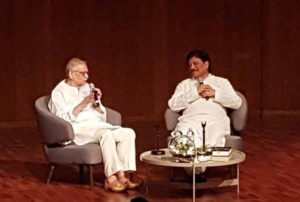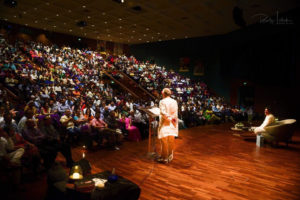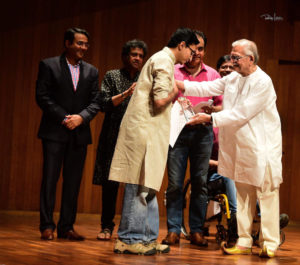Gulzaar Saab leaves Sydney spell-bound!

Gulzar Saab in conversation with Salim Arif
By Aradhana Bhatt
Gulzar ! The name is associated with versatility; it is associated with subtle expression of emotions of fine human sensibility and deep universal truths. Sydneysiders got a taste of these elements and a lot more when they attended ”˜Guftagu with Gulzar Saab, curated by Salim Arif’ on Saturday, 27th January 2018. The imposing Sir John Clancy Auditorium was a befitting backdrop to the gracious presence of Gulzar Saab, who walked on stage to a thunderous applause, clad in his trademark white cotton kurta-payjama. The organisers, Heart and Soul Productions, ought to be congratulated for arranging this distinctive event for lovers of literature.

The evening opened with renditions of some of Gulzar Saab’s songs rendered by reputed Sydney singers and musicians. Srijani Daan and Avijit Sarkar, accompanied by Sydney’s talented musicians. Srijani’s ”˜Yaaraa sili sili’ will linger in the memories of the audience for a long time to come. A trophy for budding singers has been instituted by Heart and Soul Productions following rounds of competition involving participants from Australia, New Zealand and Fiji. The first Musicfare Award was announced that evening, and the trophy was awarded to Vikas Kolkar with contestants conferred trophies and certificates by Gulzarji on stage.

Vikas Kolkar, winner of Musicfare Award, honoured by Gulzar
Salim Arif’s name needs no introduction to Indian theatre and movie lovers. An alumnus of NSD, Delhi, he has, to his credit, several theatrical and cinematic productions and is well-known for bringing literary works to life, on stage. When a personality of this stature curates, the Guftagu, expectations are naturally high. Salim opened the conversation with a question that would concern many tall figures like Gulzar Saab. ”˜How do you react when lines you never wrote or said are credited to you and circulate on social media as your quotes?’ ”˜It comes down to one’s self-esteem and confidence in oneself’ was the bottom-line of the bard’s reply delivered half-jokingly.
“People who do that must have really low self esteem and therefore have reservations about publishing the lines with their names,” concluded Gulzar.
Conversation about poetry, about some of his movies and about song-writing maintained the audience interest throughout, but somehow the ”˜Guftagu’ seemed patchy and failed to develop and take shape into a discussion that would reveal the creative genius that Gulzar is. He talked about what makes poetry, meter and movement, similes and metaphors; he also talked about how his love for books prompted him to abandon the film arena.
“Poetry is when emotion has found its thought and the thought has found words”- a Robert Frost saying, oft quoted, sums up Gulzar’s creativity. The pinnacle of the ”˜Guftagu’ evening was the session when the bard recited some of his Nazms in his inimitable style and his deep emotive voice.
There was an opportunity for the audience to ask questions in the brief Q&A session.
”˜Did you really base ”˜Aandhi’ on Mrs Indira Gandhi’s life? If not, then why was it banned during her emergency rule?’, was one of the questions, a question that looms in many minds.
In his typical style Gulzar promptly retorted ”˜just by a streak of grey hair, people decided it was about Mrs Gandhi?!’, and then went on to refute claims of parallels between his character Aarti and Mrs Gandhi. Like all things good, the evening had to conclude; the soft, silken voice humbly expressed his gratitude to an audience that stood in ovation.
A saying goes- ”˜The greatness of a great man lies in the way he treats small people.’ Those who may have noticed Gulzar Saab’s small gesture from stage are sure to have been touched by it. Half way through his ”˜Guftagu’ he said he was looking for a young lady, daughter of his tennis-mate in Bandra Gymkhana, where he still plays tennis regularly. He expressed a wish to see her after the show. She lives in Sydney after she married and was present in the auditorium. What a sweet memory he created for a friend’s daughter to treasure forever!
Some of us were fortunate enough to be able to attend the invitees only Meet and Greet evening on Friday, January 26. It was a rare opportunity to meet and interact with the visiting virtuoso of words in a relaxed and informal atmosphere. Although Gulzar Saab, looked a little tired that evening, he was still agile, sweet-tempered and ready-witted. Poornima Menon did a fine job compeering and moderating the evening. When ”˜yours truly’ asked Gulzar saab about the art and craft of making historical movies in the light of current climate of violent events relating to historical facts and fiction and in view of the fact that Gulzar made ”˜Mirza Galib’ and ”˜Taheer Munshi Premchand ki’ some of the best TV serials in the history of Indian television, he went at lengths to elucidate how a director studies or needs to study history and its characters.
“Every movie or a TV serial is a work of art. And every work of art is the artist’s interpretation. To that extent some facts may seem inaccurate in a film, but we have to gracefully allow the director or writer that freedom of interpretation. Those who have watched the film ”˜Padmavat’ have not found it offensive in any way.”
When asked about his charcoal sketches, he humbly admitted to not being a professional artist.
“It is just like scribbling, you know. It’s nothing more than that. I cannot say much about them as I do not claim to be an artist.”
He spoke about the love of one’s own language, but acknowledged the reality that language evolves and that the use of chaste poetic Urdu or Hindi may baffle some.
“A movie song has to fit the character and the situation;” he pointed out and then went on to illustrate this with his lyric ”˜Bidi Jalai le’ in the film ”˜Omkara’.
When a versatile personality like Gulzar Saab is around, an hour or two of ”˜Guftagu’ with him, seems like a drop from the ocean. A quiet but strong voice in the audience left a little disappointed, asking for more: more of Gulzar’s Saab’s poetry, a longer and more in-depth conversation (Guftagu). Yet a drop is welcome if it creates a yearning for the ocean. One can only hope that Sydneysiders get more such literary events that prompt us to re-define our concept of ”˜entertainment’.
Short URL: https://indiandownunder.com.au/?p=10374
